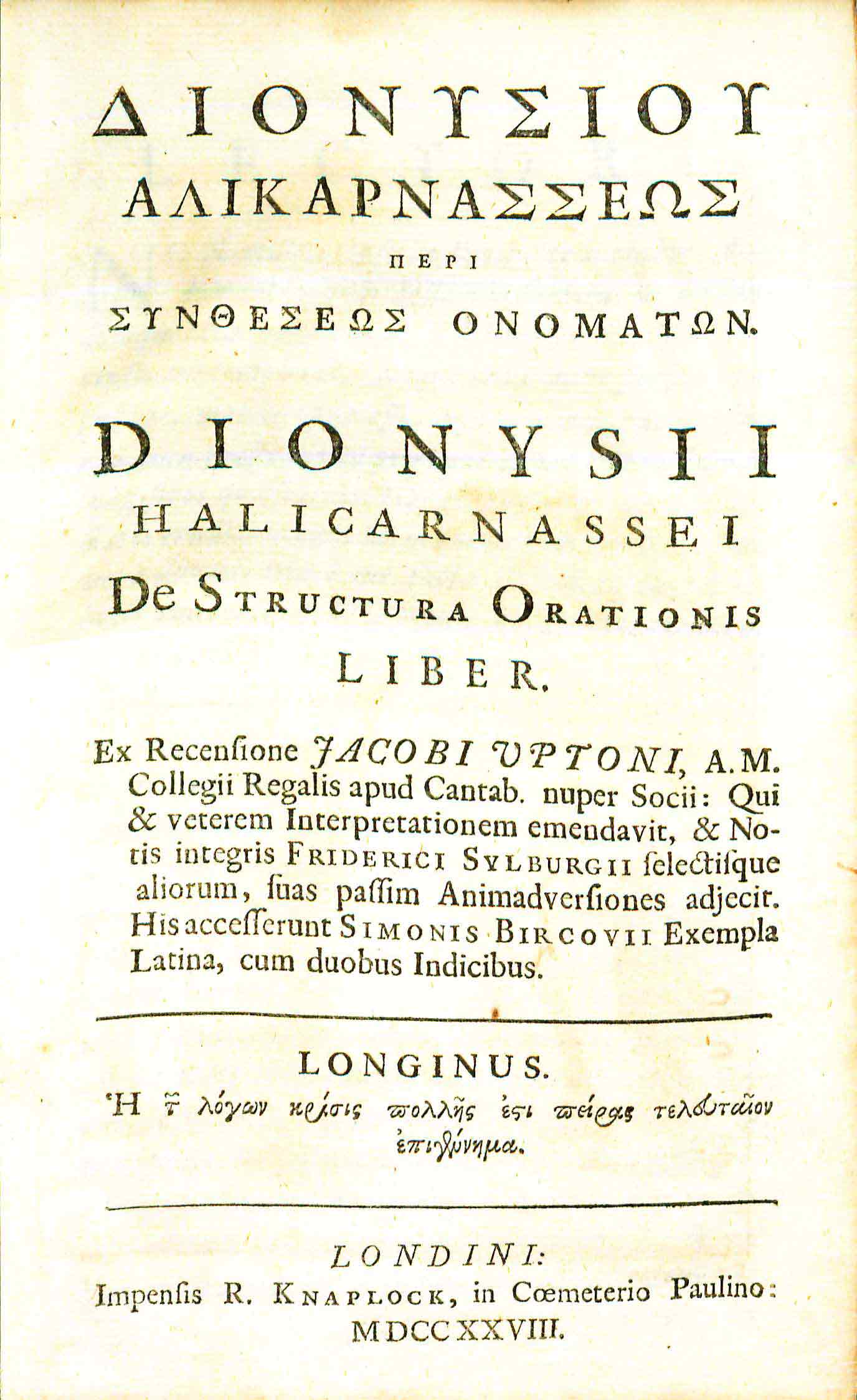Dionysiou Halikarnasseōs Peri Syntheseōs Onomatōn
Dionysiou Halikarnasseōs Peri Syntheseōs Onomatōn = Dionysii Halicarnassei De Structura Orationis Liber
by Dionysius of Halicarnassus
| Dionysiou Halikarnasseōs Peri Syntheseōs Onomatōn | |
|
Title page from Dionysiou Halikarnasseōs Peri Syntheseōs Onomatōn, George Wythe Collection, Wolf Law Library, College of William & Mary. | |
| Author | Dionysius of Halicarnassus |
| Published | Londini: Impensis R. Knaplock, in Cœmeterio Paulino |
| Date | 1728 |
| Language | Latin |
| Pages | 263, 43 p. |
| Desc. | 8vo (23 cm.) |
Dionysius of Halicarnassus (60 BCE–7 BCE) was a Greek historian and an instructor in the art of rhetoric. His Rhōmaïke Archaiologia is considered to be one of the most valuable sources of early Roman history.[1] Dionysius initially migrated to Rome in 30 BCE and spent twenty-two years studying the Latin language and preparing materials for his history.[2] In addition to dedicating time to his own studies, he also gave lessons in rhetoric during his period in Rome.[3] Rhōmaïke Archaiologia (Roman Antiquities) consisted of twenty, carefully researched books.[4] Even though some critics consider Dionysius to be a mediocre historian, many agree that he was an exceptional literary critic who was very proficient at examining an author’s style and historical context.[5] In addition to authoring his extensive history of Rome, Dionysius also wrote essays on a variety of topics. His essay “Peri syntheseos onomaton” is the only surviving ancient discussion of word order.[6]
Evidence for Inclusion in Wythe's Library
Description of the Wolf Law Library's copy
Bound in contemporary full roan with red morocco label on gilt-decorated spine. Includes the armorial bookplate of "Dav. Durrell, A.M. Coll. Pemb." with the motto "Dos est magna parentum virtus" (The virtue of parents is a great dowry" (Horace)) on the front pastedown. A second motto is written on the printed bookplate in Arabic: "لا فخر بالمال والنسب بل فخر بالعلم والأدب" (Nobleness is not in wealth and lineage, rather nobleness is in knowledge and culture). Purchased from Rulon-Miller Books.
View this book in William & Mary's online catalog.
References
- ↑ Encyclopædia Britannica Online, s. v. "Dionysius of Halicarnassus", accessed November 07, 2013.
- ↑ Ibid.
- ↑ Ibid.
- ↑ William Smith and Charles Anthon, "Dionysius of Halicarnassus" in A New Classical Dictionary of Greek and Roman Biography, Mythology, and Geography, Partly Based Upon the Dictionary of Greek and Roman Biography and Mythology, rev. ed. (New York: Harper & Brothers, 1851), 6.
- ↑ Encyclopædia Britannica Online, s. v. "Dionysius of Halicarnassus."
- ↑ Ibid.
